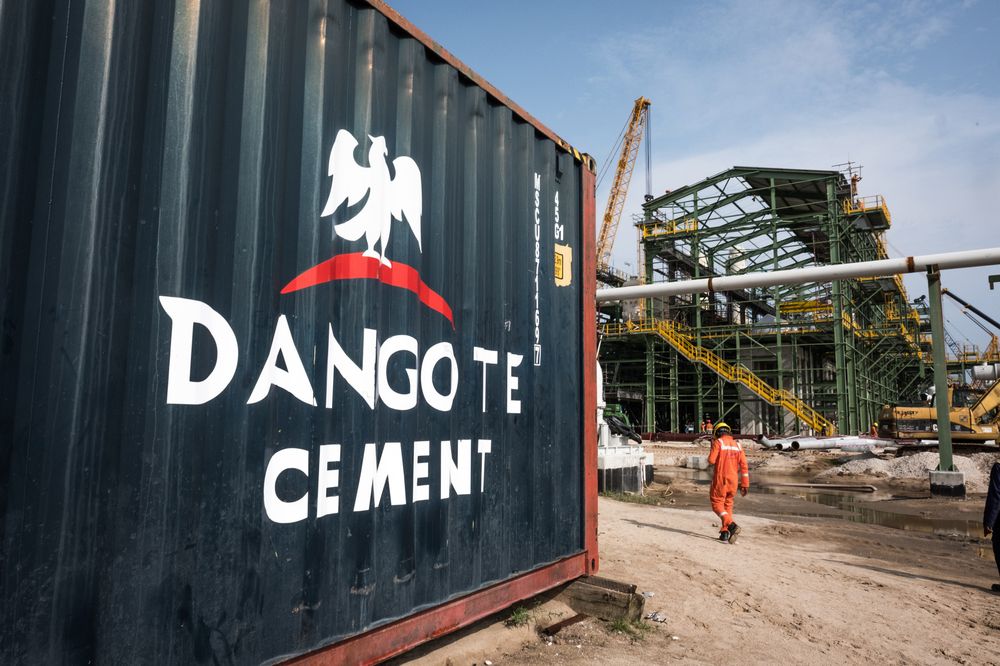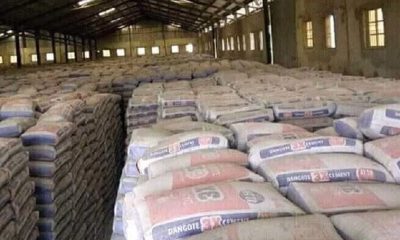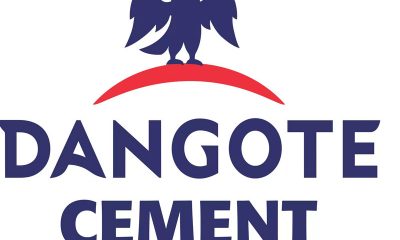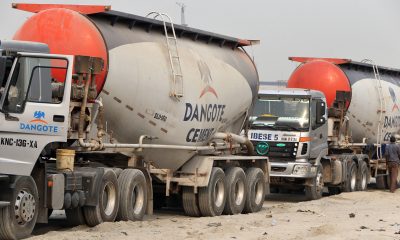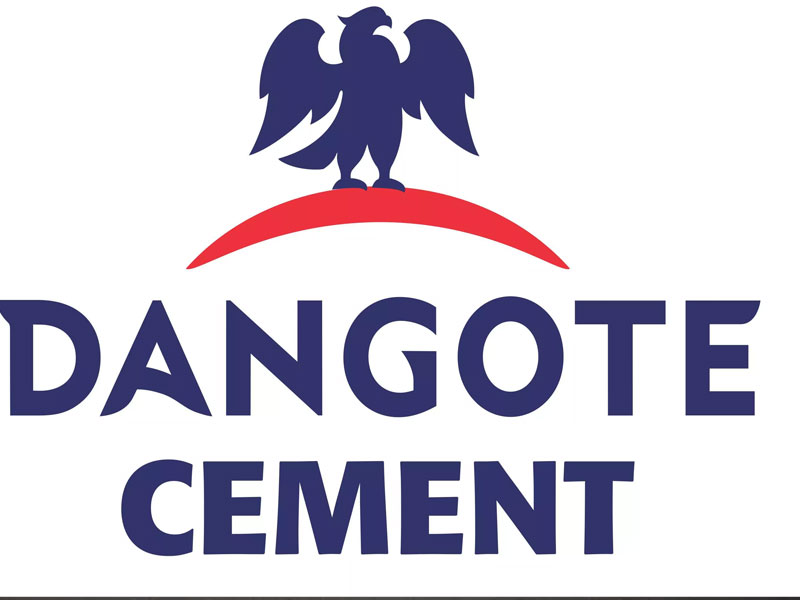Economy
Moody’s Downgrades Dangote Cement Rating to B1
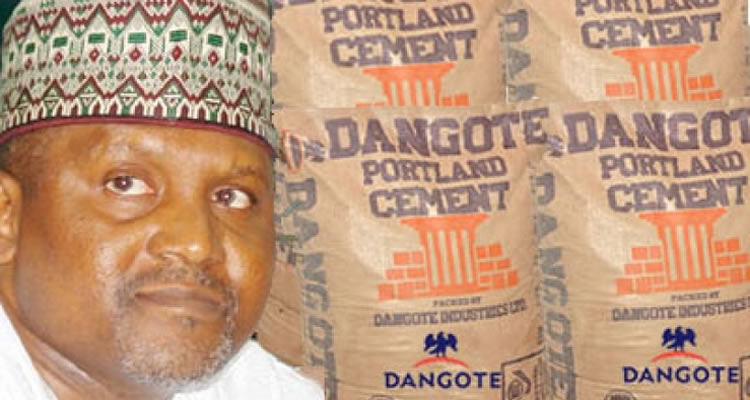
By Modupe Gbadeyanka
The corporate family rating (CFR) of Dangote Cement Plc has been downgraded by Moody’s Investors Service to B1 from Ba3.
A statement issued by Moody’s said Dangote Cement’s probability of default rating was downgraded to B1-PD from Ba3-PD, but said the firm’s national scale rating (NSR) remains unaffected at Aaa.ng with outlook on the ratings still stable.
Explaining the reason it downgraded the cement producer’s ratings, Moody’s said it was as a result of the downgrade of Nigeria’s rating to B2 from B1.
“We have downgraded Dangote Cement because it is not totally immune from Nigeria’s continuing economic challenges which the country’s government has been slow in responding to,” stated Douglas Rowlings, Vice President, Senior Analyst and lead analyst for Dangote Cement Plc at Moody’s.
“But Dangote Cement’s rating is one notch above the Nigerian sovereign’s to reflect its resilient and strong credit profile and management’s continuing success in navigating Nigeria’s tough operating environment,” added Mr Rowlings.
Dangote Cement’s B1 CFR, one notch above the Government of Nigeria’s B2 rating considers the company’s stronger intrinsic credit quality balanced against the meaningful linkage and limited ability to withstand stress at the Nigerian sovereign or macroeconomic level.
The CFR also reflects the track record of demonstrated financial support from a larger and more diversified parent, Dangote Industries Limited (DIL).
This affords additional parent level financial strength by being part of a broader diversified group of companies under the DIL umbrella, the rating agency said.
Dangote Cement has a very strong credit profile, and would likely be rated higher without its linkage with Nigeria, in part because of its leverage which registered 1.3x gross debt/EBITDA for the last 12 months ended September 30, 2017, Moody’s said in a statement issued on November 10, 2017.
This is significantly low relative to global peers, even those rated investment grade. The strong standalone profile also incorporates high operating margins trending above 50%; high interest coverage as measured by EBIT/interest expense trending above 8x over the next 18 months; and conservative funding policies with debt funding matched to the currency of cash flow generation and prudent financial policies which will ensure sustenance of strong credit metrics through operating and project build cycles, it added.
The statement noted that Dangote’s sales and margins continue to benefit from the ongoing activity in the Nigerian economy.
Nevertheless Dangote remains at this stage strongly linked to Nigeria and its economy, with 89 percent of its EBITDA anchored in the country for the 9 months ended September 30, 2017.
Its investments in new plant capacity in other sub Saharan countries will provide more diversification in future but it will take several years before there is a meaningful diversification of revenue, profits and cashflows away from the Nigerian economy. Pan-African volumes expected to reach 40% of total sales volumes by 2020.
The ratings also factor in the relatively small scale level of cement production when compared to global peers along with production of 23.6 million tonnes (mt) for the Financial Year Ended (FYE) 31 December 2016; and a concentration of production in Nigeria, representing around 68% of revenues for the FYE 2016.
DCP’s ratings are further predicated upon a continuing growing cement market share of 65% in Nigeria as Africa’s most populous country and its largest economy where GDP is expected to reset to growth levels of around 2.5% in 2017 despite the ensuing low oil price environment; protected domestic production in the various African markets in which it operates, given on-going restrictions on imports; and competitive advantage brought about by an intention to always be the lowest cost cement producer in the markets where it operates, with a differentiated offering in Nigeria through access to low cost coal as an energy resource and a comprehensive fleet network, the statement further said.
Under Moody’s forecasts DCP’s liquidity profile is sufficient to meet the company’s cash needs over the next 12 months. Moody’s estimates that funds from operations generation of N641 billion ($1.8 billion) for the next 12 months and an unrestricted cash balance of N130 billion ($361 million) as of September 30, 2017 are sufficient to cover maintenance capex of N11 billion ($31 million), planned expansion capex of N198 billion ($550 million) and dividends of N254 billion ($705 million). Uncommitted expansion capex will require external funding.
This will be supported by DCP’s four committed trade finance facilities for a total amount of N130 billion ($401 million) to be used to cover import payments via issuance of letters of credit.
Additionally, DCP’s liquidity benefits from proven ongoing support from DIL. Although Moody’s does not expect that DCP would require liquidity support from DIL, the rating agency expects that this would be forthcoming if ever needed.
It stated that the stable ratings outlook reflects Moody’s expectation that DCP will continue to maximize output from existing plants outside Nigeria, while continuing to observe conservative financial policies. At the same time, the stable outlook assumes the ability to refinance maturing debt predominantly due to DIL through a Nigerian naira denominated bond issuance.
Moody’s said a downgrade of DCP’s rating would result if there was a move away from its conservative financial policies most notably its matching of the currency of its underlying cash flow generation to that of its debt commitments.
Downward pressure on the ratings could also arise should liquidity become pressured; adjusted debt to EBITDA trend above 4x; adjusted EBIT to interest expense trend below 2.5x; or operating margins fall below 20% on a sustained basis.
Any downward momentum on the Federal Government of Nigeria’s rating could also exert pressure on DCP’s ratings.
Similarly, the introduction of special taxes, levies or other punitive measures in respect of profits or cashflow by the government of Nigeria could put downward pressure on the ratings and/or outlook.
Upward pressure on the ratings is constrained by the Government of Nigeria’s local currency issuer rating of B2 as Moody’s considers a strong interlinkage with DCP’s ratings due to the high revenue contribution from its domestic operations which contains the company to be rated one rating level above the sovereign.
Economy
LIRS Urges Taxpayers to File Annual Returns Ahead of Deadline

By Modupe Gbadeyanka
All individual taxpayers in Lagos State have been advised to file their annual tax returns ahead of the March 31 deadline.
This appeal was made by the Lagos State Internal Revenue Service (LIRS) in a statement issued by its Head of Corporate Communications, Mrs Monsurat Amasa-Oyelude.
The notice quoted the chairman of LIRS, Mr Ayodele Subair, as saying that timely filing remains both a constitutional and statutory obligation as well as a civic responsibility.
The statutory filing requirement applies to all taxable persons, including self-employed individuals, business owners, professionals, persons in the informal sector, and employees under the Pay-As-You-Earn (PAYE) scheme.
In accordance with Section 24(f) of the 1999 Constitution of the Federal Republic of Nigeria, Sections 13 &14(3) of the Nigeria Tax Administration Act 2025 (NTAA), every individual with taxable income is required to submit a true and correct return of total income from all sources for the preceding year (January 1 to December 31, 2025) within 90 days of the commencement of a new assessment year.
“Filing of annual tax returns is not optional. It is a legal requirement under the Nigeria Tax Administration Act 2025. We encourage all Lagos residents earning taxable income to file early and accurately.
“Early and accurate filing not only ensures full adherence with statutory requirements, but supports effective monitoring and forecasting, which are critical to Lagos State’s fiscal planning and long-term sustainability,” Mr Subair stated.
He further noted that failure to file returns by the statutory deadline attracts administrative penalties, interest, and other enforcement measures as prescribed by law.
To enhance convenience and efficiency, all individual tax returns must be submitted electronically via the LIRS eTax portal at https://etax.lirs.net. The platform enables taxpayers to register, file returns, upload supporting documents, and manage their tax profiles securely from anywhere.
In keeping with global best practices, Mr Subair reiterated that LIRS continues to prioritise digital tax administration and taxpayer support services. He affirmed that the LIRS eTax platform is secure and accessible worldwide. Taxpayers requiring assistance may visit any of the LIRS offices or other channels.
Economy
NNPC Targets 230% LPG Supply Surge to 5MTPA Under Gas Master Plan 2026

By Adedapo Adesanya
The Nigerian National Petroleum Company (NNPC) Limited has said the Gas Master Plan 2026 targets over 230 per cent scale-up of Liquefied Petroleum Gas (LPG) supply from 1.5 million tonnes per annum (MTPA) to 5 MTPA this year.
The Executive Vice President for Gas, Power and New Energy at NNPC, Mr Olalekan Ogunleye, unveiled the strategic direction of the NNPC Gas Master Plan 2026, outlining an aggressive expansion drive to position Nigeria as a regional and global gas powerhouse.
Mr Ogunleye delivered the keynote address at the 2026 Lagos Energy Week, organised by the Society of Petroleum Engineers (SPE), where he detailed plans to accelerate gas development, deepen infrastructure and significantly scale domestic supply.
According to him, the Gas Master Plan targets a scale-up of LPG or cooking gas supply from 1.5 MTPA to 5 MTPA, alongside expanded feedstock for Mini-LNG and Compressed Natural Gas (CNG) projects.
“The NNPC Gas Master Plan 2026 is a blueprint to unlock Nigeria’s vast gas potential and translate it into tangible economic value,” Mr Ogunleye said.
He added that the strategy would also drive exponential growth in Gas-Based Industries, GBIs, strengthening local manufacturing, fertiliser production and power generation.
“Our renewed focus is on turning abundant gas resources into inclusive economic growth and improved quality of life for Nigerians,” he stated.
Mr Ogunleye said the plan aligns with the Federal Government’s Decade of Gas initiative and the presidential production targets of achieving 10 billion cubic feet per day by 2027 and 12 BCF/D by 2030.
Industry leaders at the event, including executives from Chevron Corporation, Esso Exploration and Production Nigeria Limited, Midwestern Oil and Gas Company Limited, Abuja Gas Processing Company and Shell Nigeria Gas, commended the plan and praised Ogunleye’s leadership in driving implementation excellence.
The new blueprint signals NNPC’s determination to anchor Nigeria’s energy transition on gas, leveraging infrastructure expansion and domestic utilisation to consolidate the country’s status as Africa’s largest gas reserve holder.
Economy
Shettima Blames CBN’s FX Intervention for Naira Depreciation

By Adedapo Adesanya
Vice President Kashim Shettima has attributed the Naira’s recent depreciation to the intervention of the Central Bank of Nigeria (CBN) in the foreign exchange (FX) market, stating that the currency could have strengthened to around N1,000 per Dollar within weeks if the apex bank had allowed market forces to prevail.
The local currency has dropped over N8.37 on the Dollar in the last week, as it closed at N1,355.37/$1 on Tuesday at the Nigerian Autonomous Foreign Exchange Market (NAFEM), after it went on a spree late last month and into the early weeks of February.
However, speaking on Tuesday at the Progressive Governors’ Forum (PGF), Renewed Hope Ambassadors Strategic Summit in Abuja, the Nigerian VP said the intervention was to ensure stability.
“In fact, if not for the interventions by the Central Bank of Nigeria yesterday, the 1,000 Naira to a Dollar we are going to attain in weeks, not in months. But for the purpose of market stability, the CBN generously intervened yesterday.
“So, for some of my friends, especially one of our party leaders who takes delight in stockpiling dollars, it is a wake-up call,” the vice president said.
He was alluding to CBN buying US Dollars from the market to slow down the rapid rise of the Naira.
Latest information showed that last week, the apex bank bought about $189.80 million to reduce excess Dollar supply and control how fast the Naira was gaining value.
The move was aimed at preventing foreign portfolio investors from exiting Nigeria’s fixed-income market, as large-scale sell-offs could heighten demand for US Dollars, intensify capital flight, and exert further pressure on the exchange rate.
Amid this, speaking after the 304th meeting of the monetary policy committee (MPC) of the CBN on Tuesday, Governor of the central bank, Mr Yemi Cardoso, said Nigeria’s gross external reserves have risen to $50.45 billion, the highest level in 13 years.
This strengthens the country’s foreign exchange buffers, enhances the apex bank’s capacity to defend the Naira when needed, and boosts investor confidence in the stability of the Nigerian FX market.
-

 Feature/OPED6 years ago
Feature/OPED6 years agoDavos was Different this year
-
Travel/Tourism10 years ago
Lagos Seals Western Lodge Hotel In Ikorodu
-

 Showbiz3 years ago
Showbiz3 years agoEstranged Lover Releases Videos of Empress Njamah Bathing
-

 Banking8 years ago
Banking8 years agoSort Codes of GTBank Branches in Nigeria
-

 Economy3 years ago
Economy3 years agoSubsidy Removal: CNG at N130 Per Litre Cheaper Than Petrol—IPMAN
-

 Banking3 years ago
Banking3 years agoSort Codes of UBA Branches in Nigeria
-

 Banking3 years ago
Banking3 years agoFirst Bank Announces Planned Downtime
-

 Sports3 years ago
Sports3 years agoHighest Paid Nigerian Footballer – How Much Do Nigerian Footballers Earn


